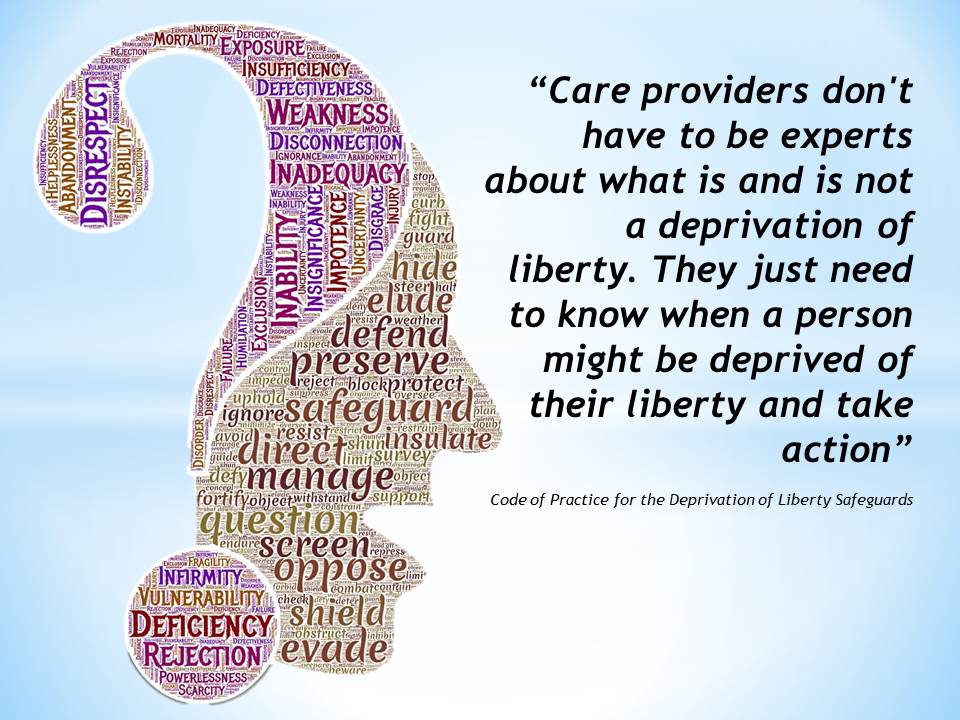 Original Image by JohnHain licensed under Creative Commons
Original Image by JohnHain licensed under Creative Commons
In a time where our Human Rights are being politicised and reviewed there are far reaching consequences of any changes. An example of this is its application to those who suffer mental health issues. Article 5 of the Human Rights Act states that ‘everyone has the right to liberty and security of person. No one shall be deprived of his or her liberty [unless] in accordance with a procedure prescribed in law’. But what happens if a person is a danger to themselves or others? How can society ensure we honour their human rights whilst protecting them from harm?
We recently had an enquiry from a member about the Mental Capacity Act. They wanted to understand how the act and, specifically, the deprivation of liberty safeguards would affect their service users. Taking away someone’s right to liberty is a very real dilemma facing service providers who are dealing with safeguarding decisions at the sacrifice of a human right. These safeguards have been put in place to help deal with that situation, give clear guidance and ensure that liberty is protected.
- The Deprivation of Liberty Safeguards are an amendment to the Mental Capacity Act 2005. They apply in England and Wales only.
- The Mental Capacity Act allows restraint and restrictions to be used – but only if they are in a person’s best interests.
- Extra safeguards are needed if the restrictions and restraint used will deprive a person of their liberty. These are called the Deprivation of Liberty Safeguards.
- The Deprivation of Liberty Safeguards can only be used if the person will be deprived of their liberty in a care home or hospital. In other settings the Court of Protection can authorise a deprivation of liberty.
- Care homes or hospitals must ask a local authority if they can deprive a person of their liberty. This is called requesting a standard authorisation.
- There are six assessments which have to take place before a standard authorisation can be given.
- If a standard authorisation is given, one key safeguard is that the person has someone appointed with legal powers to represent them. This is called the relevant person’s representative and will usually be a family member or friend.
- Other safeguards include rights to challenge authorisations in the Court of Protection, and access to Independent Mental Capacity Advocates (IMCAs).
We found that most of the published research into the Mental Capacity Act so far has, in fact, concentrated on the impact it has had in terms of issues around capacity to consent, through the Deprivation of Liberty Safeguards introduced as part of the Act.
In March 2014 the Supreme Court identified an ‘acid test’ to understand whether people were being deprived of their liberty. This, and the quantity of research being developed around this area, highlights the difficulty in ensuring that our liberties are safeguarded: each case must be individually assessed and an informed decision made, which make the safeguards vital in the appropriate treatment of vulnerable individuals.
The results of our research for our member highlighted the use of case studies in this area, especially those which highlight best practice and the individual approach. Research looked at the impact of the MCA on service users in general terms, as well as on particular groups, including people with learning disabilities, those living in residential care, and young people. After reviewing the evidence, some of the most appropriate examples we shared with our member included:
- ‘Mental capacity and the Mental Capacity Act 2005: a literature review’, which reports the main issues highlighted by service users with regards to the implementation of the Act;
- ‘Expertise and experience: people with experiences of using services and carers’ views of the Mental Capacity Act 2005’, which outlines service users’ general impressions of the MCA; and
- ‘Making choice a reality: the impact of the Mental Capacity Act on young people in transition to adulthood’, which presents findings from a research study which explored the impact of the MCA on young disabled people with complex needs and conditions.
The Idox Information Service can give you access to further information on act and provides a range of resources for social services departments, more information can be found on our website here.
To access services such as ask a researcher or find out more on how to become a member contact us here.
Share
Related Posts
By Donna Gardiner While free school meals (FSM) have been available in England on a means-tested basis since 1944, recent years have seen a renewed focus upon the potential benefits of providing free school meals to all school-aged children. Currently, ....
Today sees the start of Community Garden Week 2023. Across the UK, communities will be celebrating the many and varied types of community gardens, from children’s and neighbourhood gardens to therapy gardens and allotments. The benefits of community gardens are ....

